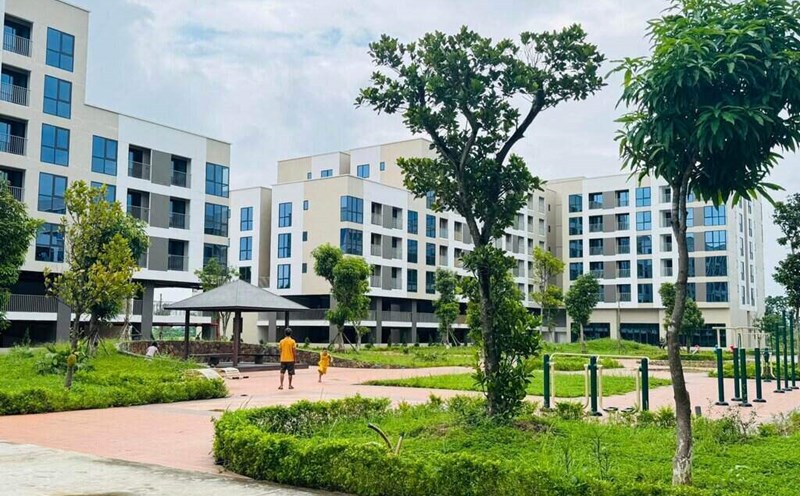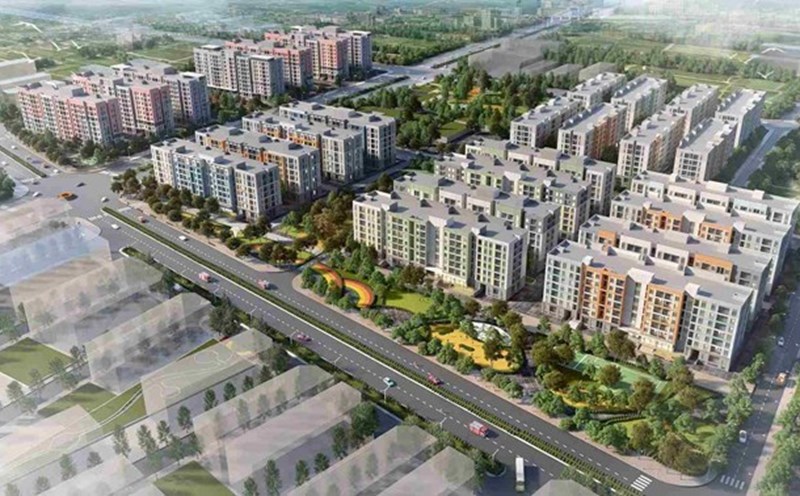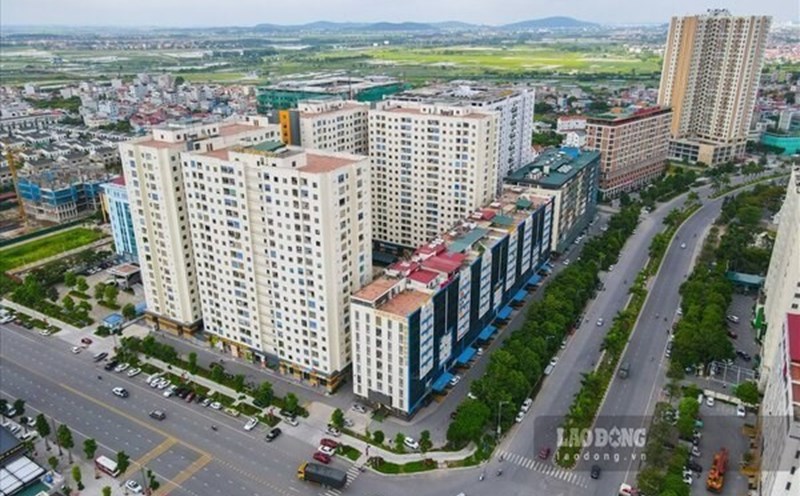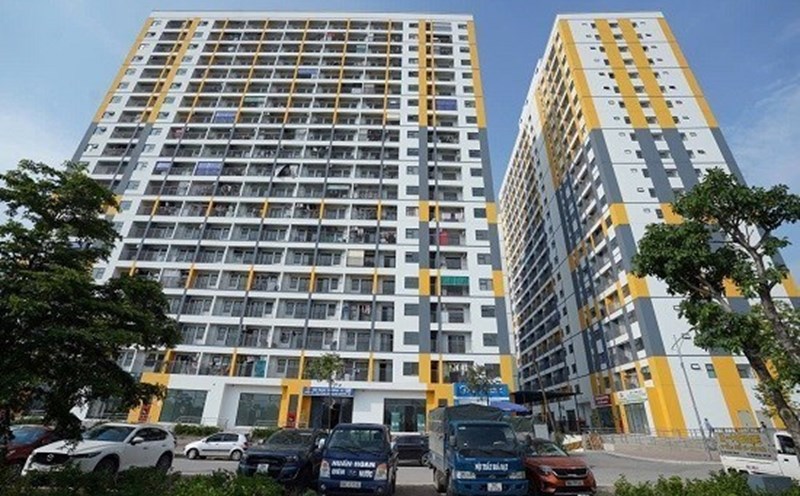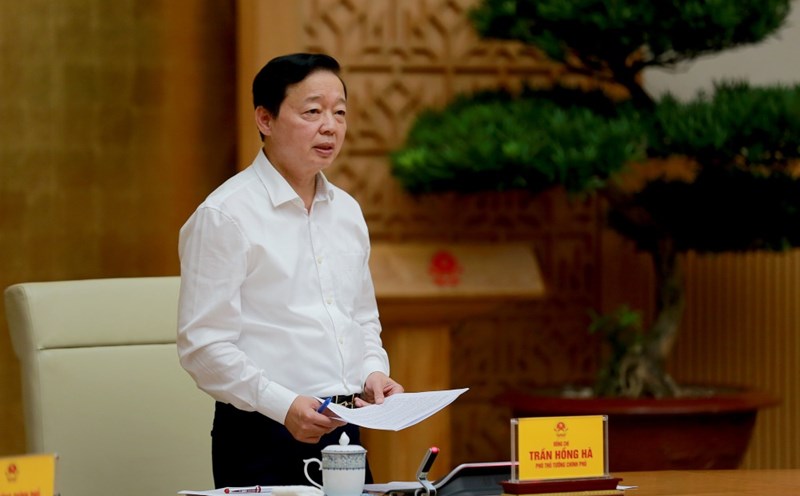It is not easy to buy because income criteria and social housing prices are also escalating
According to Decree 100/2024/ND-CP, single individuals with an income of no more than 15 million VND/month and households of both husband and wife not more than 30 million VND/month are eligible to buy social housing (NOXH). This regulation has been adjusted to increase by 4 million VND per person compared to before, but still causes many workers to "crosse the threshold" and lose the opportunity to settle down.
The case of Mr. Le Giang and his wife, an office worker in Cat Lai ward, is a typical example. His family has a total income of 35 million VND/month, 5 million VND higher than the regulation, so they cannot register to buy social housing. In fact, after deducting insurance, tax, and daily living expenses, their actual income is only about 30 million VND - an unattainable amount to buy a commercial house.
Market research shows that social housing prices in Ho Chi Minh City are increasing steadily in the secondary market. The HQC Binh Trung Dong project opened for sale in 2017 at a price of 18-22 million VND/m2, and is now traded at 33-36 million VND/m2. Vinh Loc D'Gold apartment (Binh Chanh) used to cost 16 million VND/m2, now for sale at 24-26 million VND/m2. Meanwhile, commercial apartments in Ho Chi Minh City are increasing by an average of 15-20% per year, pushing prices higher and higher.
"Young workers, civil servants, and people working in Ho Chi Minh City must wait many years to have the opportunity to buy social housing. As for the middle-income group, they are not given policy priority and are not able to buy commercial houses" - Mr. Le Hoang Chau - Chairman of the Ho Chi Minh City Real Estate Association (HoREA) - commented.
Raising the income threshold - expanding opportunities for workers
Faced with the above situation, Politburo member and Prime Minister Pham Minh Chinh recently agreed with the proposal of the Ministry of Construction on raising the threshold of income for purchasing social housing. According to the proposal, single people with an income of no more than 20 million VND/month and households of the couple with no more than 40 million VND/month will be approved. This is a positive signal, opening up opportunities for many workers who are " backward-throwing" between the two segments.
However, experts say that the new policy still has points to calculate. Dr. Nguyen Duy Phuong, Investment Director of DG Capital, analyzed that the new regulation expands the subjects but has not been thoroughly resolved. People with an income of 20-25 million VND/month in large cities like Hanoi and Ho Chi Minh City still find it very difficult to buy a house because of the expensive cost of living. "It is possible to study the option of adjusting the income threshold for social housing approval for each economic zone. Income criteria for enjoying incentives should be flexible by region, similar to the current way of building a regional minimum wage, reducing barriers to access social housing - Dr. Nguyen Duy Phuong proposed.
Sharing this view, many experts emphasized that in addition to raising the income threshold, it is necessary to establish a flexible approval mechanism, based on the actual cost of each locality, instead of applying a common rate for the whole country.
The income barrier is only a part. Many administrative procedures related to buying and selling and approving social housing records are currently complicated, discouraging workers. Land funds for social housing development are also limited, leading to an increasing gap between supply and demand.
Mr. Le Hoang Chau said that, in parallel with increasing the supply of social housing, it is necessary to encourage the development of the low-cost commercial housing segment with separate incentive policies to reduce pressure on the market. In addition, it is also necessary to change social thinking, from the mentality of "must buy a house" to "rent a house for a long time", to reduce financial pressure on workers and limit speculation and price hike.
A series of new projects have been started nationwide
On August 19, 22 social housing projects were started simultaneously in many provinces and cities. In Ho Chi Minh City, there are two projects including social housing at 4 Phan Chu Trinh (Binh Thanh) and HUD Thu Duc social housing area. Hanoi also has the HUD - Me Linh Central project.
Many other localities also simultaneously implemented: Ninh Binh (4 projects), Quang Tri (3 projects), Bac Ninh (3 projects), Quang Ninh (2 projects), Khanh Hoa, Dong Nai, Ca Mau, Ha Tinh, Thai Nguyen, Lao Cai... This is a specific step to realize the target of 1 million social housing units according to the Government's Project.
According to the Ministry of Construction, by July 2025, the whole country has 692 social housing projects implemented with a scale of 633,559 units. Of which, 422 projects were approved for investment policy (4 18.220 units), 124 projects have started construction (112.952 units) and 146 projects have been completed (102.387 units). This figure reached 59.6% of the project target.
Determined to complete at least 100,000 units in 2025
The Prime Minister has identified the minimum development target of 100,000 social housing units in 2025 as an unchanged task. Since the beginning of the year, this target has been assigned to ministries, branches and localities, including the Ministry of National Defense, the Ministry of Public Security, and the Vietnam General Confederation of Labor.
In the first 7 months of 2025, 36,962/100,275 units (37%) were completed. It is expected that by the end of the year, an additional 36,700 units will be completed, bringing the total to 73,671 units, reaching 73% of the plan. The Prime Minister requested localities to focus highly, attaching personal responsibility to the secretary and Chairman of the Provincial People's Committee for the results of social housing development.
The State Bank continues to coordinate to promote the disbursement of a credit package of VND120,000 billion for social housing, workers' housing and armed forces. In particular, the Government requires the arrangement of preferential credit packages for cadres, civil servants, and public employees affected by the restructuring of the apparatus, as well as young workers with housing needs. However, localities must review procedures, cut cumbersome steps, and strictly control to avoid negativity and policy profiteering.
The head of the Government also requested localities to focus on directing and urging investors to implement the construction of social housing projects, striving to complete and exceed the assigned targets in the decision to adjust the targets for completing social housing in 2025 and the following years until 2030.
For completed projects, investors are required to urgently ensure environmental restoration, green, clean and beautiful light; deploy procedures, widely announce on mass media to sell to people.
As for projects under construction, the Prime Minister requested that for projects in the completion stage, investors should be urged to focus resources and construct according to the committed schedule, to be completed in 2025.
For the remaining projects and projects that have just started construction in 2025, priority will be given to implementing administrative procedures, grasping and immediately resolving difficulties and problems... creating all conditions for investors to implement the project; requiring investors to focus resources, constructing with the spirit of "3 shifts, 4 teams", "overcoming the sun, overcoming the rain", completing at least 26,000 apartments in 2025 and creating a basis for completing the target for the following years.
The Prime Minister directed the development and submission to the Government of a draft Decree on the national housing fund, raising the threshold of income for purchasing social housing in a more appropriate direction, building an index to measure and evaluate the results of social housing development by month, quarter, and year in conjunction with the assessment of cadres.

